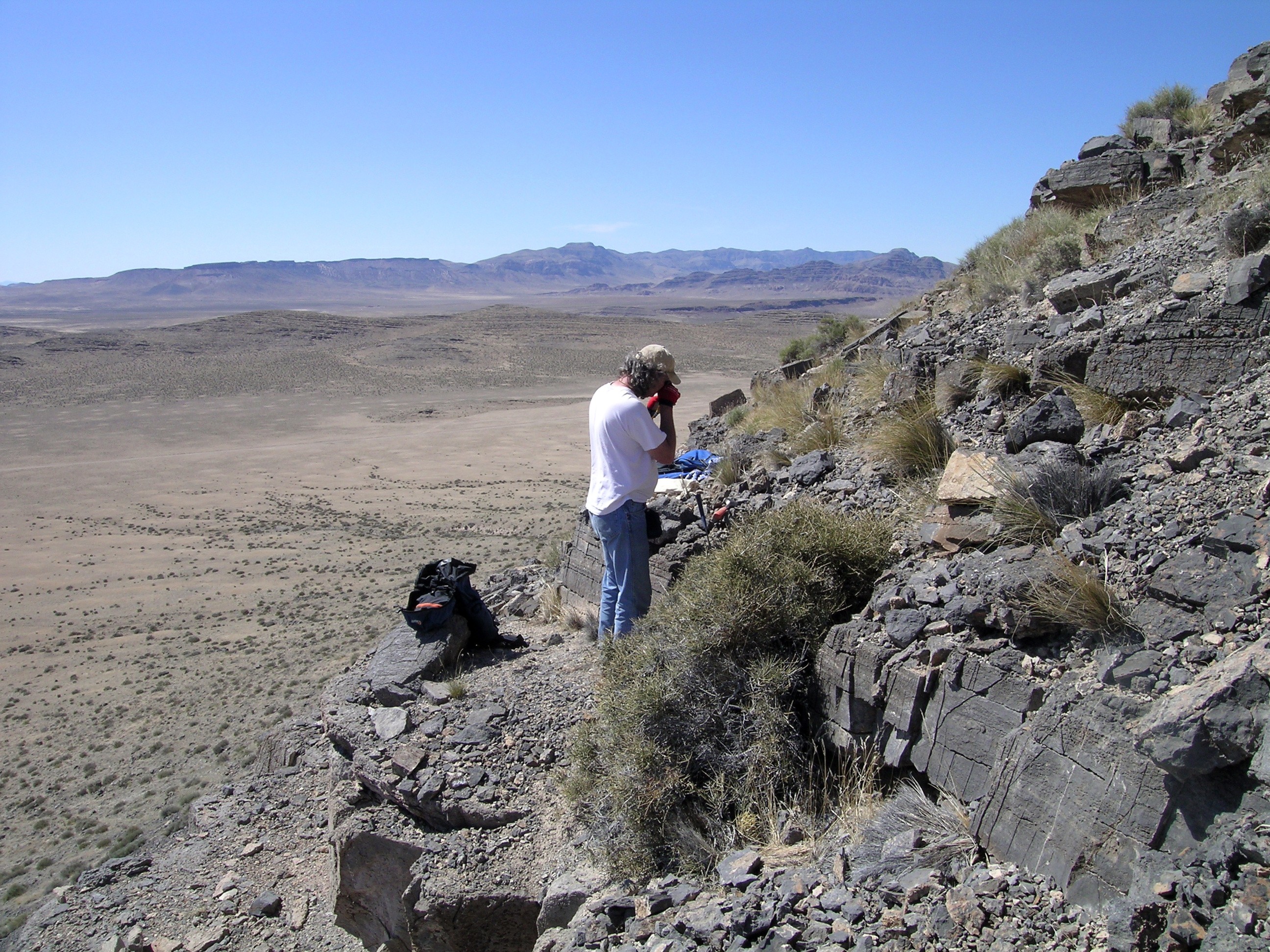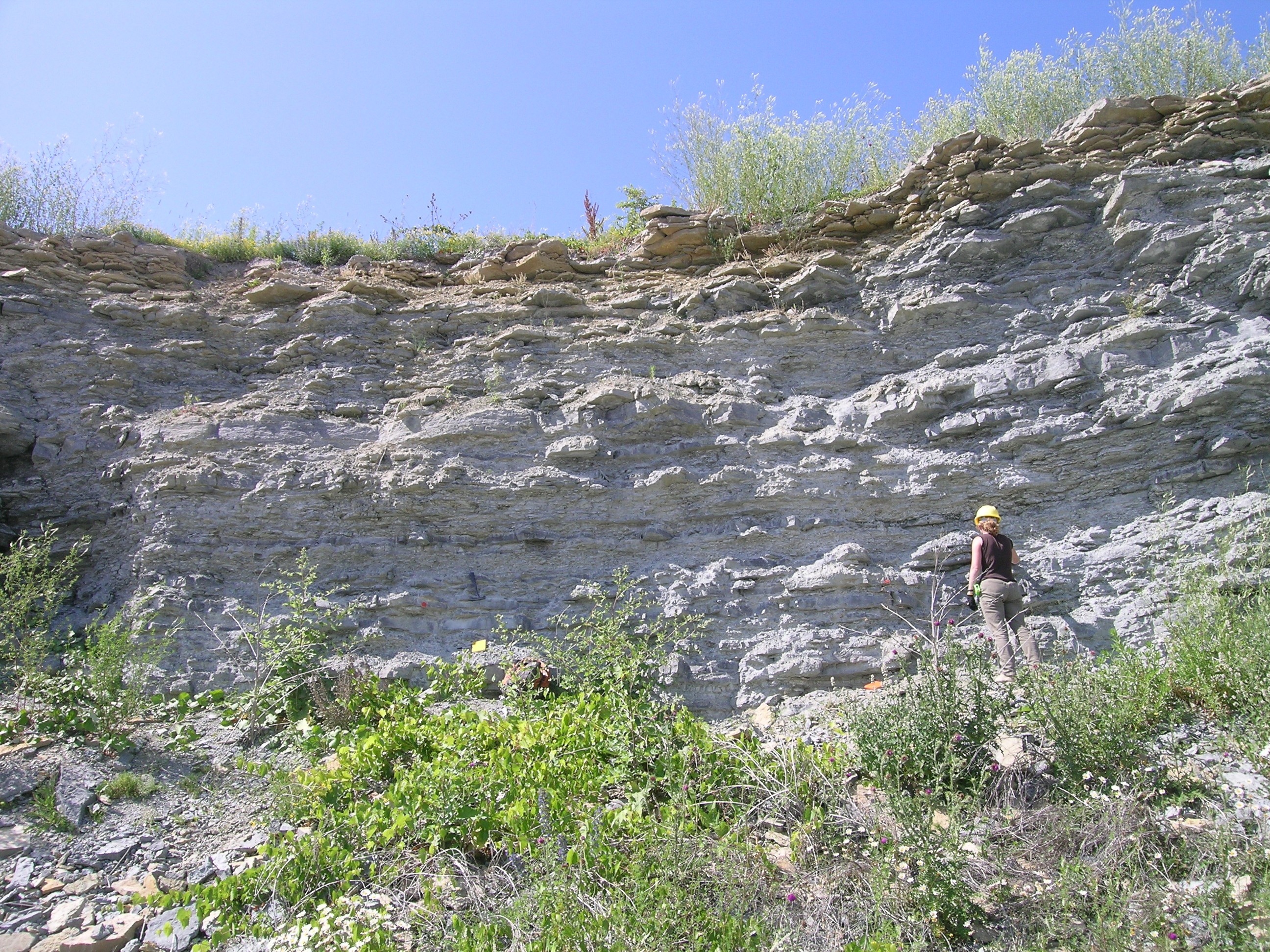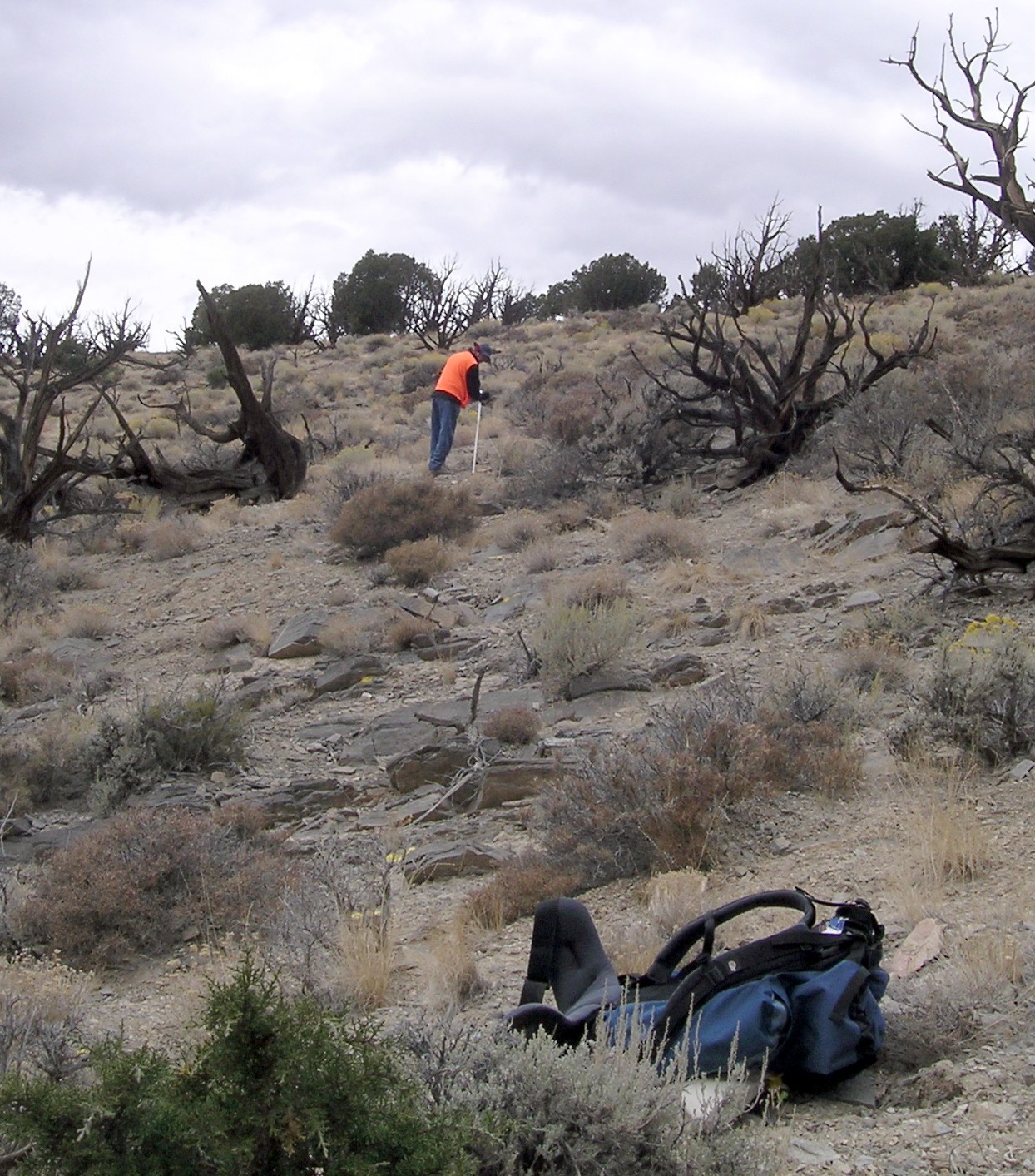What Is A Paleontologist Exploring fossils and ancient life? WHAT.EDU.VN offers insights into this exciting field. Paleontology, a captivating blend of biology and geology, seeks to understand the history of life on Earth through fossil study. Unearth the mysteries of prehistoric organisms, extinct species, and their evolutionary relationships, exploring sedimentary rocks and unlocking Earth’s deep past.
1. What Is A Paleontologist And What Do They Study
Paleontologists are scientists who study prehistoric life, including plants, animals, fungi, bacteria, and other organisms. They examine fossils to understand the evolution of life on Earth, past environments, and major extinction events. These experts piece together the history of our planet by meticulously analyzing fossil records and sedimentary rocks, unveiling the mysteries of long-vanished ecosystems.
1.1. Delving Into The Fossil Record
At the heart of paleontology lies the fossil record. This invaluable collection of preserved remains, impressions, and traces of ancient organisms provides direct evidence of life’s history. Paleontologists meticulously excavate, prepare, and analyze fossils to decipher their age, anatomy, and evolutionary relationships.
1.2. The Interdisciplinary Nature Of Paleontology
Paleontology is not confined to a single scientific discipline. It beautifully combines aspects of biology, geology, chemistry, and even physics. Paleontologists must possess a broad understanding of these fields to interpret the fossil record accurately and reconstruct ancient ecosystems.
- Geology: Understanding rock formations, stratigraphy, and geological time scales is essential for dating fossils and interpreting their context.
- Biology: Knowledge of anatomy, physiology, and evolutionary principles is crucial for identifying and classifying fossils, as well as understanding their relationships to living organisms.
- Chemistry: Geochemistry and isotopic dating techniques help paleontologists determine the age of fossils and reconstruct past environmental conditions.
- Physics: Techniques like X-ray imaging and computational modeling assist in analyzing fossil structures and simulating ancient environments.
1.3. What Is The Scope Of Paleontological Research
Paleontological research is incredibly diverse, encompassing a wide range of topics and approaches. Some paleontologists focus on specific groups of organisms, such as dinosaurs, mammals, or plants. Others specialize in particular time periods or geographic regions. Many paleontologists use advanced technologies like CT scanning and 3D modeling to study fossils in unprecedented detail.
1.4. Unearthing The Past For A Better Future
Paleontology is not just about studying the past. It also offers valuable insights into the present and future. By understanding how organisms and ecosystems responded to past environmental changes, paleontologists can help us predict and mitigate the impacts of current and future climate change.
2. What Does A Paleontologist Do On A Daily Basis
The daily life of a paleontologist can be remarkably varied, ranging from fieldwork in remote locations to laboratory analysis and academic research. The specific tasks depend on their specialization, research focus, and employment setting.
2.1. The Thrill Of Fieldwork
Fieldwork is often considered the most exciting aspect of paleontology. Paleontologists venture into remote and often challenging environments to search for fossils. This involves:
- Surveying potential fossil sites: Identifying geological formations known to contain fossils.
- Excavating fossils: Carefully removing fossils from the surrounding rock matrix using specialized tools.
- Documenting findings: Recording the precise location, orientation, and geological context of each fossil.
- Collecting samples: Gathering rock and sediment samples for further analysis.
2.2. Laboratory Analysis And Preparation
Once fossils are collected, they are transported to the laboratory for preparation and analysis. This meticulous process can involve:
- Cleaning fossils: Removing dirt, rock, and other debris from the fossil surface.
- Consolidating fragile fossils: Applying adhesives or other stabilizing agents to prevent damage.
- Preparing fossils: Removing surrounding rock matrix using specialized tools like air scribes and micro-abrasive blasters.
- Identifying fossils: Comparing fossils to known species and identifying new species.
- Analyzing fossils: Using various techniques like microscopy, X-ray imaging, and isotopic analysis to study fossil structure and composition.
2.3. Research And Publication
Paleontologists conduct research to interpret the fossil record and reconstruct ancient life. This involves:
- Analyzing data: Interpreting fossil data in the context of geological and evolutionary theory.
- Writing scientific papers: Communicating research findings to the scientific community through peer-reviewed publications.
- Presenting research: Sharing research findings at scientific conferences and public lectures.
- Collaborating with other scientists: Working with researchers from other disciplines to address complex scientific questions.
2.4. Teaching And Outreach
Many paleontologists are also involved in teaching and outreach activities, which can include:
- Teaching university courses: Educating students about paleontology, geology, and evolutionary biology.
- Mentoring students: Guiding and supporting students in their research projects.
- Developing museum exhibits: Creating engaging and informative exhibits for the public.
- Giving public lectures: Sharing their knowledge and passion for paleontology with the general public.
2.5. Curation And Collection Management
Paleontologists play a crucial role in curating and managing fossil collections. This involves:
- Organizing and cataloging fossils: Ensuring that fossils are properly stored and accessible for research.
- Maintaining databases: Creating and maintaining databases of fossil specimens and associated data.
- Loaning fossils to other researchers: Facilitating research by making fossils available to scientists around the world.
3. What Skills And Qualifications Are Needed To Become A Paleontologist
Becoming a paleontologist requires a strong foundation in science, excellent analytical skills, and a passion for understanding the history of life.
3.1. Educational Requirements
The path to becoming a paleontologist typically involves:
- Bachelor’s degree: A bachelor’s degree in geology, biology, or a related field. Coursework should include paleontology, geology, biology, chemistry, and mathematics.
- Master’s degree: A master’s degree in paleontology or a related field. This degree provides more specialized training in research methods and paleontological techniques.
- Doctorate (Ph.D.): A Ph.D. is usually required for research and academic positions. This involves conducting original research and writing a dissertation.
3.2. Essential Skills
In addition to formal education, paleontologists need a variety of skills, including:
- Analytical skills: The ability to analyze data, interpret fossils, and draw conclusions based on evidence.
- Problem-solving skills: The ability to solve complex scientific problems using creative and innovative approaches.
- Communication skills: The ability to communicate research findings effectively, both orally and in writing.
- Fieldwork skills: The ability to conduct fieldwork in remote and challenging environments.
- Laboratory skills: The ability to prepare and analyze fossils using specialized tools and techniques.
- Computer skills: Proficiency in computer software for data analysis, modeling, and visualization.
- Patience and attention to detail: Paleontology often involves meticulous work and careful observation.
3.3. Key Qualities
Beyond skills and qualifications, successful paleontologists typically possess certain qualities:
- Passion for science: A genuine interest in understanding the natural world and the history of life.
- Curiosity: A desire to explore new ideas and ask questions.
- Perseverance: The ability to overcome challenges and persist in the face of setbacks.
- Collaboration: The ability to work effectively with other scientists and researchers.
4. What Are The Different Types Of Paleontologists
Paleontology is a broad field with many sub-disciplines, each focusing on different aspects of prehistoric life.
4.1. Vertebrate Paleontologists
Vertebrate paleontologists study the fossils of vertebrate animals, including dinosaurs, mammals, birds, reptiles, and fish. They focus on:
- Dinosaur paleontology: Studying the evolution, behavior, and extinction of dinosaurs.
- Mammalian paleontology: Studying the evolution and diversification of mammals.
- Paleoherpetology: Studying the evolution of reptiles and amphibians.
- Paleoichthyology: Studying the evolution of fishes.
4.2. Invertebrate Paleontologists
Invertebrate paleontologists study the fossils of invertebrate animals, including insects, mollusks, crustaceans, and other organisms without backbones. They focus on:
- Micropaleontology: Studying microscopic fossils, such as foraminifera and diatoms.
- Paleoentomology: Studying the evolution of insects.
- Paleomalacology: Studying the evolution of mollusks.
4.3. Paleobotanists
Paleobotanists study the fossils of plants, including trees, shrubs, flowers, and other vegetation. They focus on:
- Plant evolution: Studying the evolution and diversification of plants.
- Paleoecology: Reconstructing past plant communities and ecosystems.
- Palynology: Studying fossil pollen and spores to reconstruct past vegetation and climate.
4.4. Micropaleontologists
Micropaleontologists specialize in the study of microscopic fossils, such as foraminifera, diatoms, and radiolarians. These tiny fossils are incredibly abundant and diverse, providing valuable information about past environments and climate change.
4.5. Paleoecologists
Paleoecologists reconstruct ancient ecosystems and study the interactions between organisms and their environment. They analyze fossils, sediments, and other geological data to understand:
- Past climates: Reconstructing past temperature, precipitation, and other climate variables.
- Ancient habitats: Identifying the types of environments that existed in the past, such as forests, grasslands, and aquatic ecosystems.
- Food webs: Reconstructing the flow of energy through ancient ecosystems.
- Extinction events: Understanding the causes and consequences of mass extinction events.
5. Where Do Paleontologists Work
Paleontologists can find employment in a variety of settings, including:
5.1. Universities And Colleges
Many paleontologists work at universities and colleges, where they:
- Teach courses: Educate students about paleontology, geology, and evolutionary biology.
- Conduct research: Pursue their own research interests and publish their findings in scientific journals.
- Mentor students: Guide and support students in their research projects.
- Secure funding: Write grant proposals to secure funding for their research.
5.2. Museums
Museums are another common employer of paleontologists. Museum paleontologists:
- Curate collections: Manage and care for fossil collections.
- Develop exhibits: Create engaging and informative exhibits for the public.
- Conduct research: Study the museum’s fossil collections and publish their findings.
- Engage in outreach: Give public lectures and lead educational programs.
5.3. Government Agencies
Some paleontologists work for government agencies, such as:
- Geological surveys: Conduct geological research and mapping.
- National parks: Manage and protect fossil resources in national parks.
- Environmental agencies: Assess the environmental impacts of development projects.
5.4. Private Industry
A small number of paleontologists work in private industry, typically in:
- Oil and gas companies: Use fossils to date and correlate rock formations.
- Environmental consulting firms: Assess the environmental impacts of development projects.
6. What Are Some Of The Most Important Discoveries Made By Paleontologists
Paleontologists have made countless important discoveries that have transformed our understanding of life’s history. Here are just a few examples:
6.1. The Discovery Of Dinosaurs
The discovery of dinosaurs in the 19th century revolutionized our understanding of prehistoric life. Paleontologists have since unearthed a vast array of dinosaur fossils, revealing their incredible diversity, anatomy, and behavior.
6.2. The Link Between Dinosaurs And Birds
Paleontologists have provided compelling evidence that birds evolved from small, feathered dinosaurs. This discovery has transformed our understanding of avian evolution and the dinosaur family tree.
6.3. The Origin Of Mammals
Paleontologists have traced the evolution of mammals back to ancient reptile-like ancestors. They have discovered a rich fossil record of early mammals, revealing their gradual evolution from small, shrew-like creatures to the diverse array of mammals we see today.
6.4. The Evolution Of Humans
Paleontologists have played a crucial role in understanding the evolution of humans. They have discovered numerous fossils of early hominins, revealing the steps in our evolutionary journey from ape-like ancestors to modern humans.
6.5. Understanding Mass Extinction Events
Paleontologists have studied mass extinction events, such as the extinction of the dinosaurs, to understand the causes and consequences of these catastrophic events. Their research has revealed the importance of factors like asteroid impacts, volcanic eruptions, and climate change in driving mass extinctions.
7. What Are The Current Challenges And Future Directions In Paleontology
Paleontology faces several challenges and exciting opportunities in the 21st century.
7.1. The Threat Of Fossil Poaching
Fossil poaching, the illegal collection and sale of fossils, is a growing threat to paleontological research. Poachers often damage or destroy fossil sites, and the loss of fossils to the black market deprives scientists of valuable data.
7.2. The Need For Better Fossil Preservation
Fossils are fragile and can be easily damaged or destroyed. Paleontologists are working to develop better methods for preserving fossils, both in the field and in museum collections.
7.3. The Application Of New Technologies
New technologies, such as CT scanning, 3D modeling, and computational analysis, are revolutionizing paleontology. These technologies allow paleontologists to study fossils in unprecedented detail and to reconstruct ancient organisms and ecosystems with greater accuracy.
7.4. Addressing Climate Change
Paleontology can play a crucial role in addressing climate change. By studying how organisms and ecosystems responded to past climate changes, paleontologists can help us predict and mitigate the impacts of current and future climate change.
7.5. Engaging The Public
Paleontology is a fascinating and engaging science that can inspire people of all ages. Paleontologists are working to engage the public through museum exhibits, educational programs, and online resources.
8. FAQ About Paleontologist
| Question | Answer |
|---|---|
| What is the difference between paleontology and archeology? | Paleontology studies prehistoric life, while archeology studies past human societies. Paleontologists study fossils, while archeologists study artifacts and other human-made objects. |
| How do paleontologists date fossils? | Paleontologists use a variety of methods to date fossils, including radiometric dating, stratigraphy, and biostratigraphy. Radiometric dating measures the decay of radioactive isotopes in rocks and fossils. Stratigraphy studies the layering of rocks to determine the relative age of fossils. |
| What is the largest dinosaur ever discovered? | The largest dinosaur ever discovered is believed to be Argentinosaurus, a massive sauropod that lived in South America during the Late Cretaceous period. |
| What caused the extinction of the dinosaurs? | The extinction of the dinosaurs is believed to have been caused by an asteroid impact that occurred about 66 million years ago. The impact triggered widespread environmental changes, including global cooling and wildfires, which led to the extinction of many plant and animal species. |
| What is the role of paleontology in understanding climate change? | Paleontology provides valuable insights into past climate changes and how organisms and ecosystems responded to those changes. This information can help us predict and mitigate the impacts of current and future climate change. |
| What is the process of fossilization? | Fossilization is the process by which the remains of an organism are preserved in rock. This process typically involves the replacement of organic material with minerals, as well as the compression and hardening of the surrounding sediment. |
| How do paleontologists reconstruct ancient environments? | Paleontologists reconstruct ancient environments by analyzing fossils, sediments, and other geological data. They look for clues about past climate, vegetation, and animal life to create a picture of what the environment was like in the past. |
| What are some of the ethical considerations in paleontology? | Ethical considerations in paleontology include the responsible collection and preservation of fossils, the protection of fossil sites, and the sharing of research findings with the public. |
| How do paleontologists identify new species? | Paleontologists identify new species by comparing fossils to known species and looking for unique characteristics. They also analyze the geological context of the fossil and its evolutionary relationships to other organisms. |
| What are some of the challenges of fieldwork in paleontology? | Challenges of fieldwork in paleontology include working in remote and challenging environments, dealing with extreme weather conditions, and protecting fossils from damage. |



9. Learn More About Paleontology
9.1. Resources For Aspiring Paleontologists
- The Paleontological Society: A professional organization for paleontologists.
- The Society of Vertebrate Paleontology: A professional organization for vertebrate paleontologists.
- Museums with paleontology collections: Many museums have extensive paleontology collections and offer educational programs for students and the public.
9.2. Stay Curious And Ask Questions
Paleontology is a constantly evolving field, with new discoveries being made all the time. Keep asking questions, explore new ideas, and never stop learning about the fascinating history of life on Earth. Uncover the secrets of the past and help shape the future of this exciting field.
10. Unearth Your Curiosity With WHAT.EDU.VN
Are you fascinated by paleontology and eager to learn more? Do you have burning questions about prehistoric life, fossils, or the work of paleontologists? Don’t let your curiosity go unanswered. At WHAT.EDU.VN, we provide a platform where you can ask any question and receive answers from knowledgeable experts.
Whether you’re a student, a researcher, or simply someone with a thirst for knowledge, WHAT.EDU.VN is your go-to resource for reliable and informative answers. We understand the challenges of finding accurate information and the frustration of unanswered questions. That’s why we’ve created a space where you can connect with experts and receive the guidance you need.
Here’s how WHAT.EDU.VN can help you:
- Ask any question: No matter how specific or complex your question, our experts are ready to provide clear and concise answers.
- Get answers quickly: We understand the importance of timely information. Our platform ensures that you receive answers promptly.
- Access expert knowledge: Our team comprises professionals from various fields, including paleontology, geology, biology, and more.
- Enjoy a user-friendly experience: Our platform is designed to be easy to use, allowing you to ask questions and receive answers effortlessly.
- Connect with a community: Join a community of curious minds and engage in discussions about topics that interest you.
Ready to dive deeper into the world of paleontology? Visit WHAT.EDU.VN today and ask your question. Our experts are waiting to share their knowledge and help you unravel the mysteries of ancient life.
Don’t let your questions linger. Get the answers you need at WHAT.EDU.VN.
Contact us:
- Address: 888 Question City Plaza, Seattle, WA 98101, United States
- Whatsapp: +1 (206) 555-7890
- Website: WHAT.EDU.VN
We’re here to help you explore the fascinating world of paleontology and beyond. Start asking questions and unlock a wealth of knowledge at what.edu.vn.

